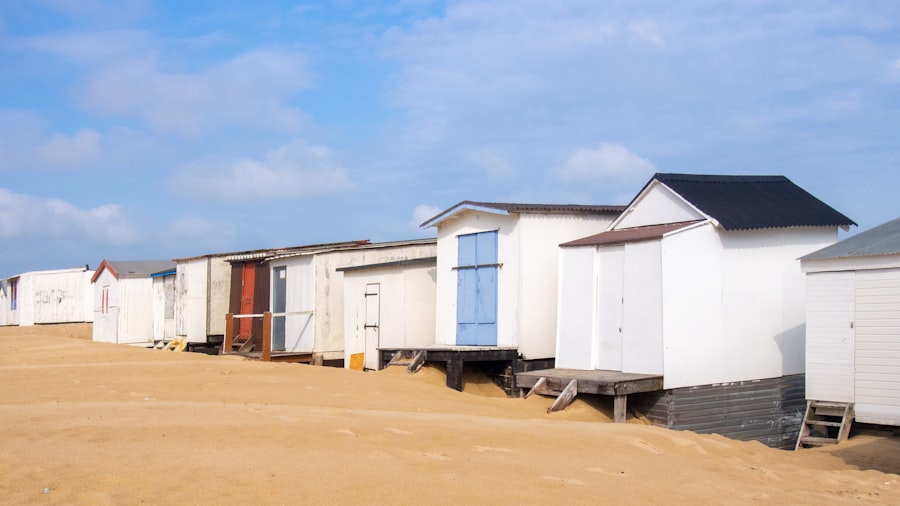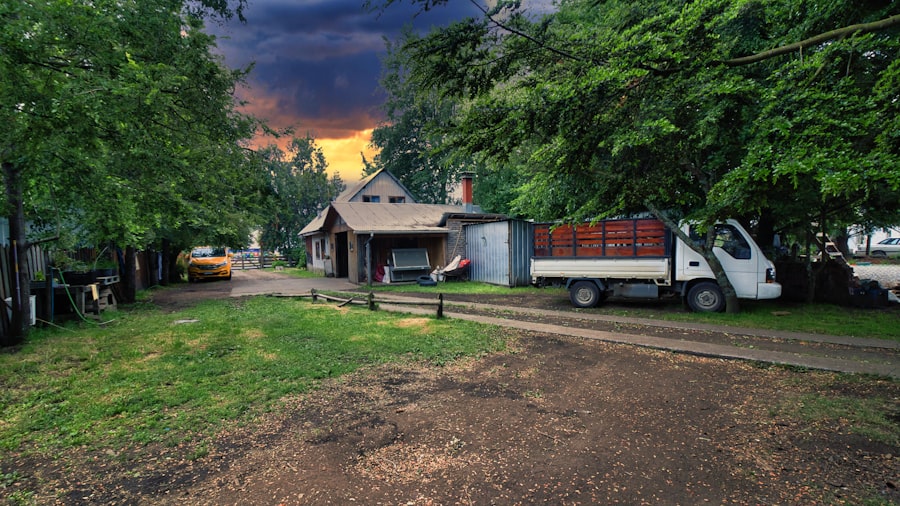The evolution of trailer homes, often referred to as mobile homes or manufactured homes, has undergone a remarkable transformation over the past few decades. Once viewed primarily as temporary housing solutions or low-cost alternatives, modern trailer homes have emerged as stylish, functional, and permanent residences that cater to a diverse demographic. The shift began in the late 20th century when advancements in construction technology and design began to reshape public perception.
Today, these homes are not only affordable but also customizable, allowing individuals and families to create living spaces that reflect their personal tastes and lifestyles. The rise of modern trailer homes can be attributed to several factors, including economic pressures, changing demographics, and a growing desire for minimalism. As housing prices soared in urban areas, many individuals found themselves priced out of traditional homeownership.
This economic reality has led to a renewed interest in trailer homes, which offer a more accessible entry point into the housing market. Additionally, younger generations are increasingly drawn to the idea of downsizing and simplifying their lives, making trailer homes an appealing option for those seeking a more sustainable and manageable lifestyle.
Key Takeaways
- Modern trailer homes have evolved significantly, offering improved design and comfort.
- Trailer homes provide affordable, flexible, and sustainable living options.
- Innovations in construction enhance energy efficiency and aesthetic appeal.
- Overcoming social stigma is key to wider acceptance of trailer home living.
- Growing communities and financing options make trailer homes a viable lifestyle choice.
Advantages of Living in a Trailer Home
Living in a trailer home presents numerous advantages that appeal to a wide range of individuals and families. One of the most significant benefits is affordability. Compared to traditional homes, trailer homes typically come with lower purchase prices and reduced property taxes.
This financial accessibility allows homeowners to allocate their resources toward other essential areas of life, such as education, travel, or retirement savings. Furthermore, the lower utility costs associated with smaller living spaces can lead to significant long-term savings. Another advantage is the flexibility that trailer homes offer.
Many modern trailer homes are designed for mobility, allowing residents to relocate their homes with relative ease. This feature is particularly appealing for those who enjoy traveling or wish to explore different regions without the commitment of traditional homeownership. Additionally, trailer parks often provide a sense of community that can be hard to find in more conventional neighborhoods.
Residents frequently form close-knit relationships with their neighbors, fostering a supportive environment that enhances the overall living experience.
Design and Innovation in Trailer Home Construction

The design and construction of trailer homes have evolved significantly, reflecting contemporary architectural trends and consumer preferences. Modern trailer homes often feature open floor plans, high ceilings, and large windows that create a sense of spaciousness and light. Many manufacturers now offer customizable options, allowing buyers to select finishes, layouts, and features that suit their individual needs.
This level of personalization has helped dispel the notion that trailer homes are synonymous with cramped and outdated living conditions. Innovative building materials and techniques have also played a crucial role in the transformation of trailer home construction. For instance, the use of energy-efficient insulation and sustainable materials has become increasingly common, resulting in homes that are not only aesthetically pleasing but also environmentally friendly.
Additionally, advancements in modular construction have streamlined the building process, enabling quicker assembly times without sacrificing quality. As a result, modern trailer homes can rival traditional houses in terms of both design and durability.
Sustainability and Environmental Benefits of Trailer Homes
| Metric | Description | Environmental Benefit | Typical Value/Range |
|---|---|---|---|
| Energy Consumption | Average energy used for heating, cooling, and appliances | Lower energy use reduces carbon footprint | 30-50% less than traditional homes |
| Material Usage | Amount of building materials required per square foot | Less material reduces resource depletion and waste | 40-60% less than conventional construction |
| Water Usage | Average water consumption per household | Efficient fixtures reduce water waste | 20-30% less than traditional homes |
| Carbon Emissions | CO2 emissions from construction and operation | Lower emissions contribute to climate change mitigation | Up to 50% reduction compared to site-built homes |
| Waste Generation | Construction and demolition waste produced | Less waste reduces landfill impact | 70-80% less waste generated |
| Land Use Efficiency | Space required for housing footprint | Smaller footprint preserves natural habitats | Typically 300-800 sq ft per unit |
| Mobility and Reusability | Ability to relocate or repurpose the home | Reduces need for new construction and land disturbance | 100% mobile and reusable |
Sustainability is a growing concern for many homeowners today, and trailer homes offer several environmental benefits that align with eco-friendly living principles. One of the primary advantages is their smaller footprint. With less square footage than traditional homes, trailer homes require fewer resources for construction and maintenance.
This compact design not only reduces material waste but also minimizes energy consumption over time. Moreover, many modern trailer homes are built with sustainable materials and energy-efficient systems. Features such as solar panels, energy-efficient appliances, and water-saving fixtures contribute to lower utility bills while reducing the overall environmental impact.
Additionally, the mobility of trailer homes encourages a lifestyle that is less reliant on commuting and more focused on local living. By situating themselves in communities that prioritize walkability and access to public transportation, residents can further reduce their carbon footprint.
Overcoming the Stigma of Trailer Home Living
Despite the many advantages of trailer home living, there remains a persistent stigma associated with this housing option. Historically viewed as substandard or associated with lower socioeconomic status, trailer homes have often been unfairly categorized as inferior housing solutions. However, as modern designs and innovations continue to emerge, efforts are being made to change this narrative.
Advocacy groups and homeowners alike are working to highlight the benefits of trailer living and promote a more positive image. One effective strategy for overcoming this stigma is through community engagement and education. By showcasing successful trailer home communities and sharing personal stories of residents who thrive in these environments, advocates can help shift public perception.
Additionally, social media platforms have become powerful tools for promoting the beauty and functionality of modern trailer homes. Influencers and homeowners alike are sharing their experiences online, demonstrating that these residences can be stylish, comfortable, and fulfilling places to live.
Financing and Affordability of Trailer Homes

Financing options for trailer homes have evolved alongside their growing popularity. While traditional mortgages may not always be available for manufactured homes, various alternative financing solutions have emerged to accommodate potential buyers. Many lenders now offer specialized loans designed specifically for mobile or manufactured homes, making it easier for individuals to secure financing without facing exorbitant interest rates or stringent requirements.
Affordability remains one of the most compelling reasons for choosing a trailer home. The lower initial purchase price compared to traditional houses allows buyers to enter the housing market with less financial strain. Additionally, many trailer parks offer rental options for land or lot space at competitive rates, further reducing overall living costs.
This affordability factor is particularly appealing for first-time homebuyers or those looking to downsize without sacrificing quality of life.
Community and Lifestyle in Trailer Home Parks
Living in a trailer home park often fosters a unique sense of community that can be difficult to replicate in traditional neighborhoods. Many parks are designed with communal spaces such as playgrounds, gardens, or recreational facilities that encourage social interaction among residents. This shared environment promotes camaraderie and support among neighbors, creating an atmosphere where individuals can forge lasting friendships.
The lifestyle within trailer home parks can also be characterized by a strong sense of belonging and shared values. Many residents prioritize community engagement through organized events such as potlucks, holiday celebrations, or volunteer initiatives. These activities not only enhance social connections but also contribute to a vibrant community culture that enriches the overall living experience.
For many residents, this sense of community is one of the most rewarding aspects of choosing a trailer home lifestyle.
The Future of Trailer Homes: Trends and Developments
As society continues to evolve, so too does the landscape of trailer home living. Emerging trends indicate a growing acceptance of this housing option as more people recognize its benefits. The increasing focus on sustainability is likely to drive further innovation in design and construction practices within the industry.
As manufacturers respond to consumer demand for eco-friendly features, we can expect to see more energy-efficient models equipped with advanced technology. Additionally, the rise of remote work has opened new possibilities for mobile living arrangements. With more individuals able to work from anywhere, the appeal of traveling while maintaining a stable home base is becoming increasingly attractive.
This trend may lead to an uptick in demand for mobile homes that cater specifically to remote workers seeking flexibility without sacrificing comfort or style. In conclusion, the future of trailer homes appears bright as they continue to gain recognition as viable housing solutions that offer affordability, sustainability, and community engagement. As societal attitudes shift and innovations emerge within the industry, modern trailer homes are poised to play an essential role in addressing contemporary housing challenges while providing individuals with fulfilling living experiences.



